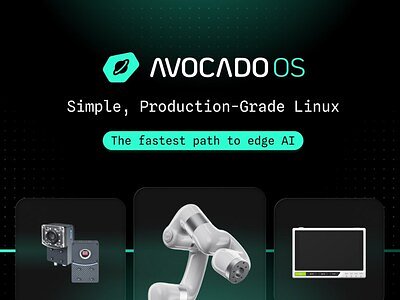
From Lab to Launch: Peridio's Avocado OS Cuts Months from Embedded AI Deployment
Scaling physical AI is notoriously difficult. Peridio’s Avocado OS aims to bridge the gap between prototype and production, slashing deployment times and unlocking faster innovation in robotics and beyond.
From Lab to Launch: Peridio's Avocado OS Cuts Months from Embedded AI Deployment
Anaheim, CA – November 5, 2025 – The promise of physical AI – robots automating factories, intelligent sensors optimizing logistics, and smart devices enhancing everyday life – is often hampered by a significant bottleneck: the laborious process of transitioning from a working prototype to a scalable, secure, and maintainable production system. Peridio, a company focused on production-grade Linux stacks for embedded AI, is tackling this challenge head-on with its Avocado OS, unveiled this week at Embedded World North America.
Avocado OS isn’t just another Linux distribution. It’s a purpose-built operating system designed to eliminate the months of rework typically required to harden a prototype for deployment. According to Peridio CEO and Co-founder Bill Brock, “What used to take months of rework now takes days.” This claim, while ambitious, appears to be resonating with industry observers and gaining traction as a potential game-changer in the rapidly evolving landscape of edge AI.
The Prototype-to-Production Problem
For years, embedded AI developers have relied on general-purpose Linux distributions like Ubuntu or Debian for prototyping. While these distros offer flexibility and a rich ecosystem of tools, they are not optimized for the rigors of production. Scaling from a single working unit to hundreds or thousands requires significant effort to address security vulnerabilities, ensure reliability, and manage updates.
“The typical path involves porting code, rebuilding toolchains, and meticulously addressing countless dependencies,” explains a senior embedded systems engineer who requested anonymity. “It’s a time-consuming and error-prone process, often requiring a dedicated team and significant investment.” This 'rework tax' has historically slowed down innovation and increased the cost of deploying physical AI systems.
Avocado OS: A Production-First Approach
Peridio’s Avocado OS addresses this challenge by offering a production-ready foundation from the outset. Built on top of the Yocto Project, a widely-used embedded Linux build system, Avocado OS boasts several key features designed to streamline the deployment process.
These include immutable runtimes – which enhance security by preventing unauthorized modifications to the system – and modular updates, enabling over-the-air (OTA) updates with minimal downtime. The OS also incorporates robust security features, such as full disk encryption, and leverages live NFS-mounted extensions for flexible software customization.
“The Yocto base is critical,” notes an industry analyst familiar with embedded systems. “It allows Peridio to deliver a highly customized and optimized OS tailored for specific hardware and application requirements, reducing bloat and improving performance.”
Demoing the Potential: Robotics and Beyond
At Embedded World, Peridio showcased Avocado OS powering a dual-arm robot, demonstrating the OS’s ability to handle complex tasks in a real-world setting. The demo highlighted the OS’s low latency and deterministic performance, essential for accurate robot control and perception.
However, the applications of Avocado OS extend far beyond robotics. The OS is well-suited for a wide range of embedded AI applications, including industrial automation, smart sensors, edge computing devices, and autonomous vehicles.
The benefits of a streamlined deployment process are particularly pronounced in the fast-moving robotics sector. “Reducing deployment time translates directly into faster time-to-market,” says a robotics company executive who asked not to be named. “It allows us to iterate faster, experiment with new features, and gain a competitive advantage.”
The Rise of Production-Ready Embedded Linux
Avocado OS is emblematic of a growing trend in the embedded systems world: the shift towards production-ready Linux distributions. For years, developers prioritized flexibility and rapid prototyping. Now, as embedded AI systems become more sophisticated and deployed at scale, the need for reliability, security, and maintainability is paramount.
“There’s a growing recognition that you can’t just ‘throw code over the wall’ and expect it to work in production,” says the industry analyst. “Companies are realizing that investing in a robust operating system foundation is essential for long-term success.”
While Peridio is not the only company offering a production-ready embedded Linux distribution, its focus on streamlining the entire deployment process – from prototyping to scaling – appears to be resonating with developers and industry observers.
Challenges and Future Outlook
Despite the promise of Avocado OS, some challenges remain. The Yocto Project, while powerful, can be complex to learn and configure. Peridio will need to provide adequate documentation and support to ensure developers can effectively utilize the OS. Furthermore, the company will need to continue to innovate and add new features to stay ahead of the competition.
However, if Peridio can successfully address these challenges, Avocado OS has the potential to become a leading platform for deploying embedded AI systems. By slashing deployment times and unlocking faster innovation, Avocado OS could play a pivotal role in accelerating the adoption of physical AI and realizing its full potential.
The company hasn't disclosed pricing models, but sources indicate it will follow a tiered subscription model, providing options to suit a range of deployment sizes and needs. As the demand for scalable and secure embedded AI systems continues to grow, Peridio's Avocado OS is well-positioned to capitalize on this trend and become a key enabler of the next generation of intelligent devices.
